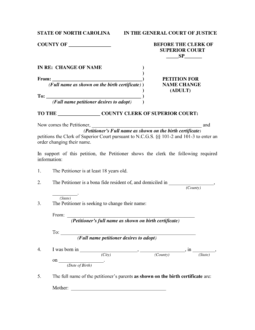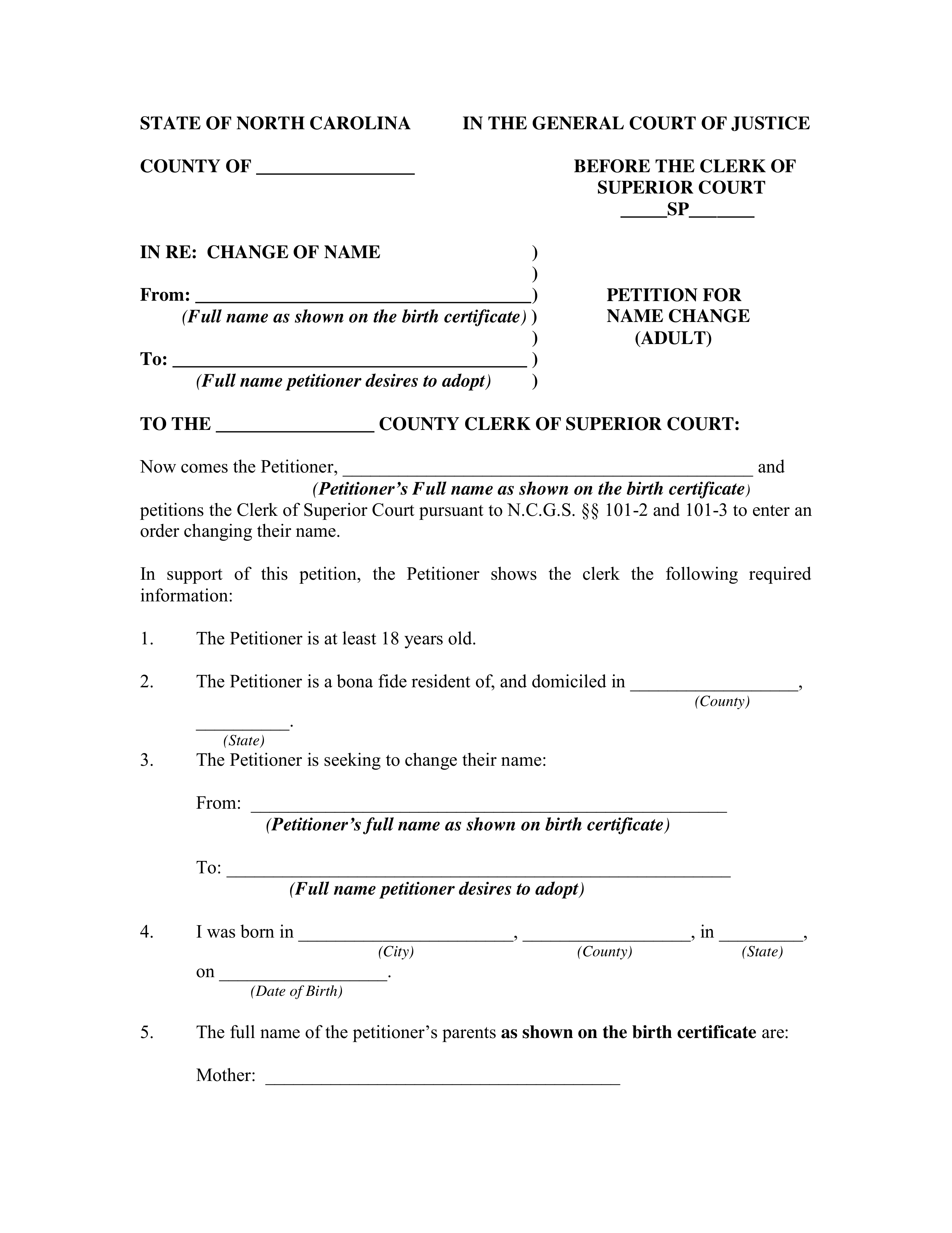Updated August 14, 2023
North Carolina name change forms can be used by residents ages 18 and over to legally change their name by following the court process. Individuals only need a copy of their marriage certificate or divorce decree to change their surname when getting married or divorced.
Name Change After Marriage
In North Carolina, a name change can be completed via a marriage license application. The petitioner has the option of either taking your spouse’s name or creating a hyphenated name.
A marriage certificate can be picked up within 10 days of the marriage being recorded. Request a certified copy of the certificate from the Register of Deeds for the appropriate county. This document can be used to update the name on a social security card, driver’s license, bank account, and passport.
Name Change After Divorce
To revert to a maiden name after a divorce, request the name change in the divorce complaint (or answer to a complaint), and the change will be included in the divorce decree. Once a divorce is final, obtain certified copies from the office of the appropriate District Court to update identification, registrations, passport, etc.
To resume using a previous surname, go to the local clerk’s office with a copy of the divorce decree and request to have a maiden name or previously married name restored. Records can also be requested via the North Carolina Vital Records Office by appointment.
How to Change Your Name (8 steps)
- Have Fingerprints Taken at Sheriff’s Office
- Complete National Criminal Background Check
- Complete North Carolina Criminal Background Check
- Submit Notice of Intent to File Name Change
- Complete Forms
- File with the Clerk
- Pay the Filing Fee
- Receive Certificate of Name Change
1. Have Fingerprints Taken at Sheriff’s Office
North Carolina requires a state and national criminal background check for all name change applicants.[1] To receive a criminal history check, you will need to go to a local sheriff’s office and have your fingerprints taken. The fee varies by county and usually must be paid by money order or cash.
A staff member will give a fingerprint card to complete. Let the staff member know that you will need two original fingerprint cards, one for the state background check, the other for the national.
2. Complete National Criminal Background Check
The national criminal background check is handled through an Identity History Summary Check from the FBI. You can begin the process through the bureau’s IdHSC Portal, which will provide instructions on how to proceed, but depending on where you live or how far you are willing to travel, you may need to complete the process by mail.
A limited number of approved post offices handle electronic fingerprint card submissions, allowing you to complete your application online. Online applications have a much faster processing time than mailed ones, with wait times of about 5-10 days versus two months.[2]
After processing your request, depending on whether or not you have a criminal history, the FBI will either send you a notice stating that no prior arrests were found, or they will deliver an Identity History Summary, which details your arrests and criminal record. You will need this notification either way.
3. Complete North Carolina Criminal Background Check
The state background check is handled by the State Bureau of Investigation (SBI) background check, and requires completing the Right to Review – Request Form. Attach it to the other fingerprint card from the sheriff’s office.State background checks are handled only by mail. Enclose these documents, along with a certified check or money order for $14 (payable to the North Carolina State Bureau of Investigation), and mail them to the address below.
North Carolina State Bureau of Investigation
Criminal Information and Identification Section
Attention: Application Unit – Right to Review
3320 Garner Road, P.O. Box 29500
Raleigh, NC 27626-0500
State background checks usually take about seven days to process once they are received.[3]
4. Submit Notice of Intent to File Name Change
A Notice of Intent to File Name Change must be filed with the civil clerk at the local superior court to be posted on their bulletin board for a period of 10 days.[4] (This step can be skipped if the applicant is a victim of domestic violence, sexual offense, or stalking.) There is no fee to file the notice.
Once complete, the applicant should obtain a copy of the “clocked notice.” Name change applicants should keep in mind that they are only allowed to change their name once, except for petitions to return to their birth name.[5]
5. Complete Forms
The following forms are required for the name change process:
-
- Petition for Name Change
- Affidavit Regarding Outstanding Tax or Child Support Obligations – To prove an applicant doesn’t have prior debts or liabilities.
- Two Affidavits of Character – Two adult residents who live in the county where you reside and are not family members must complete these documents.
- Notary Verification – Must be used when notarizing all of the above documents.
6. File with Clerk
Once these forms have been filled out, gather the completed forms and the following documents:
- FBI Identity History Summary
- State Bureau of Investigations (SBI) Personal Review
- Birth Certificate (certified copy)
- Driver’s License (with current address)
- Proof of Address (utility bill or bank statement with name and address)
Once the required 10 days have passed, bring everything to the superior court where the Notice of Intent to File Name Change was posted. Remove the notice for your application from the bulletin board, or include your “clocked” copy, and submit everything to the court clerk.
7. Pay the Filing Fee
According to the State Office of Vital Records, the filing fee is $39 ($15 for the name change, plus $24 for the first copy).[6] However, different fees can be assessed by each county, and it is best to contact the court before filing.
8. Receive the Certificate of Name Change
After the required forms have been filed with the court, the clerk will approve and send you a court order and Certificate of Name Change. This document can be used to update all your forms of identification.
Court clerks are required to approve name change applications that show good cause and include all required documents. If you believe the clerk has wrongfully denied your application, you are entitled to a hearing before a superior court judge for reconsideration, but you must petition within 30 days of the clerk’s notice of denial.[7]
Driver’s License
In North Carolina, you must apply for a new driver’s license within 60 days of changing your name.[8]
To update your name with the North Carolina Division of Motor Vehicles (NCDMV), you must first update your name with the local Social Security Administration Office at least 24-36 hours prior.
Once that’s completed, bring the following documents to an MCDMV Driver License Office:
- Court-issued proof of name change, such as a certified marriage license or certificate, divorce decree, or Certificate of Name Change
- Notarized Affidavit for Name Change (DL-101)
Voter Registration
After your name has been changed, you must update your voter registration to participate in any upcoming elections. In addition to a photo identification and social security number with matching identities, your voter registration must indicate your new name.
To update your voter registration, complete the Voter Registration Form with your new name and submit it to your local elections office or to the North Carolina State Board of Elections Office (address below).
NC State Board of Elections Office
P.O. Box 27255
Raleigh, NC 27611-7255
Your voter registration can also be updated online through the DMV.


